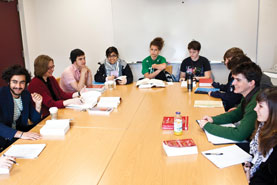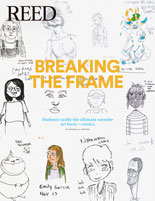
IRIS login | Reed College home Volume 96, No. 1: March 2017
Taking a Fresh Look at Hum 110
Turning a critical eye on the college’s signature humanities course
By Chris Lydgate ’90

In masterful fashion, Prof. Lena Lenček took the lectern last semester and delivered a classic lecture on the ancient Greek poet Hesiod before an audience of 300 students in Hum 110. Ranging from the myth of Prometheus to the songs of Bob Dylan, Prof. Lencek zeroed in on the central issues posed by Hesiod’s epic Works and Days. Is toil a virtue? Are the gods just? Is it acceptable to use guile in pursuit of justice?
Sitting in the back of the lecture hall, I couldn’t help but marvel at her dazzling dissection. It reminded me of everything I loved about Hum 110 when I was a student in the ’80s, frantically scribbling notes and smoking Camels.
But times change, and truth be told, not everyone loves Hum 110. As Reed and the nation become more diverse, it was perhaps inevitable that students would eventually cast a critical eye on the college’s signature humanities course. Pointing to the stubborn persistence of longstanding racial inequities in the United States, some students have called out Hum 110 as an example of cultural myopia, or even institutional racism. Shouldn’t it reflect all humanity, they ask, not just a bunch of dead white European men?
The protests against Hum 110 have ignited a respectful but passionate campus debate over the scope and structure of the course and whether it represents a vision of intellectual life in which all students feel included. At a deeper level, the debate is about race, power, culture, and the nature of education itself.
A Foundational Course
Reed’s emphasis on the humanities stretches back to its foundation. Scornful of what he called the “sheep-dip” approach to education, Reed’s first president, William T. Foster, insisted that students “specialize in the humanities” in order to grasp the fundamental interconnectedness of human knowledge. After WWI, in the teeth of a national mania for practical instruction, Reed doubled down on the humanities with yearlong courses in literature and history. In fact, when the trustees installed President Norm Coleman in 1924, students voiced bitter protests in the Quest because they worried he might water down Foster’s sweeping vision.
The course we now know as Hum 110 (originally Hum 11) was born in 1943 when the Reed faculty decided to combine the mandatory freshman literature and history courses, creating a unique intellectual experience rooted in several key elements:
- Students look at the same texts through the lens of different disciplines. They read the plays of Sophocles, for example, as both literature and philosophy; they look at Moses as both a spiritual figure and as a politician.
- Large lectures by a rotating cast of professors. Small conferences where students learn how to discuss, debate, and defend their readings. Challenging assignments that help students develop their analytical powers and writing skills.
- A focus on the ancient Mediterranean world, especially Greece, because of its enormous influence on the subsequent history of Europe and America.
In some ways, the course has changed remarkably little. The interdisciplinary structure remains in force, and many of the books that students read in 1943 are still on the current reading list, such as the Code of Hammurabi, Homer’s Iliad, Herodotus’s Histories, and works by Aeschylus, Sophocles, Euripides, Plato, and Aristotle.
But in other ways, Hum 110 has changed dramatically. The chronological and geographical scope has expanded and contracted like an accordion. At various times, it has featured the Confessions of St. Augustine, the Song of Roland, Dante’s Inferno and the welsh epic Mabinogion.
As our understanding of the ancient world has evolved, the course has evolved with it. Hum 110 now begins with the Epic of Gilgamesh and ancient Egyptian poetry, including the Book of the Dead, to provide a deeper look at the diverse cultural forces that shaped the ancient Mediterranean. Students explore gender and ethnicity in the Book of Esther and examine how women are systematically silenced in the Iliad. They read Apuleius’s Golden Ass as a subversive narrative which offers savage insight into the brutal power relations of imperial Rome. Every ten years, the faculty conduct a thoroughgoing review to make sure the course stays fresh and up to date.
Firing the Canon
To student critics, however, Hum 110 still contains glaring structural defects. It completely ignores many of the world’s great civilizations. Its authors are overwhelmingly male and white. And while Reed offers many courses that focus on other parts of the world (see the Foundations of Chinese Civilization), only Hum 110 is mandatory—a requirement, they say, that conveys the surreptitious message that white men are the authentic source of thought and civilization. Finally, the critics charge that the course does not acknowledge the role these texts have played in colonialism, racism, and slavery.
The 24 professors who teach Hum 110—and who are responsible for the curriculum—respond to these criticisms in different ways. (Which should come as no surprise; there has been robust faculty debate over the course for the last fifty years.) But after conducting several interviews and following several conversations, I’d like to offer some insights from the course’s defenders.
First, the racial categories of 21st-century America do not map well onto the ancient Mediterranean. “The idea that Hum 110 is a ‘white’ course is very strange to me,” says Prof. Jay Dickson [English]. “It presupposes that our contemporary racial categories are timeless.”
Indeed, efforts to claim ancient authors and societies as “white” or “black” have often been driven by ideological motives—before the Civil War, for example, black writers and activists pointed to ancient Egypt as a great example of black civilization, while apologists for slavery stridently insisted that the ancient Egyptians were—you guessed it—white. In any case, the notion that the ancient Greeks should be coded as white is widely challenged by scholars.
Second, the course offers an excellent platform for critically examining key constructs that have framed the narrative of race. “Whiteness, western, eastern, canon, identity, nation, race, and Europe are terms that are repeatedly historicized, considered critically, and interrogated by lecturers in Hum 110 as it currently stands,” says Prof. Lucia Martinez [English].
More important, the professors who teach Hum 110 today do not treat its texts as holy objects of veneration but rather as messages in bottles, cast into a distant sea many ages ago, laden with tantalizing clues. They analyze, dissect, compare, and contextualize the readings, unpacking the tacit assumptions and interrogating the far-reaching implications. The texts are “great” not only because they are aesthetically pleasing but also because they have exerted a tremendous influence on history—for good and for ill. Aristotle’s ideas about cause and effect, for example, provide an intellectual scaffold that scientists still rely on today. But at the same time, his doctrine of the “natural slave” in the Politics was deployed to justify the plantation system.
“I certainly understand the concerns the protesting students have registered with the existing syllabus,” says Prof. Lenček. “To them, the primary readings as currently constituted—and the secondary materials—do not represent the heritage of the entire, diverse freshman class; nor, in their view, do they articulate a systematic critique of the legacy of ancient Mediterranean civilizations.”
She goes on: “I acknowledge that their criticism is justified, but I also keep in mind that this same intersection of Mediterranean civilization incubated the ideas and forms that gave rise to many of the foundational, positive and productive institutions of Western civilization, whose benefits we enjoy in the form of freedom of speech, the rule of law, and liberal democracy, to name just a few. I think it is crucial for our students to have an accurate and critical knowledge of this civilizational legacy, just as it is crucial for us all to know and respect the multiple civilizational currents that feed our diverse society.”
Where do we go from here?
It’s clear that many students at Reed revel in the depth and complexity of Hum 110. According to an online student survey conducted in April 2016, 44% of respondents said that Hum 110 was one of the reasons they came to Reed; 70% said they would describe the course positively; 70% said they enjoyed or “sort of” enjoyed the course; and 91% said the skills they learned proved either very useful or somewhat useful in their subsequent coursework.
But the survey also revealed pockets of dissatisfaction. Only 30% of female students said they would describe the course positively. 47% of students who identify as black, indigenous, and people of color think Hum 110 should change. And 75% of transgender students think the texts should be changed. (The study was conducted by the Student Committee for Academic Policy and Planning.)
In October, the student senate sent a letter to the faculty endorsing the call for change. “Many feel that the content and the mandatory nature of [Hum 110] is alienating for underrepresented minorities and marginalized groups,” the senators wrote.
In fact, many professors want to see changes to the course, too. “Hum 110 is like a shark,” says Prof. Dickson. “It has to keep moving, or it dies.”
The Hum 110 faculty has been working with students to rethink the course. Last semester, the faculty voted to accelerate the timetable for reviewing the course, and several committees are now hard at work looking at fresh proposals. The ideas range from the modest (continuing to focus on Greece and Rome), to the innovative (Greece, Rome, and Islam), to the radical (scrap the course, hold 24 individual seminars).
“Students have been very effective in getting their concerns on the table,” says Prof. Libby Drumm [Spanish], who now chairs the Hum 110 faculty. “We’re working hard to address these concerns—maybe not as fast as everyone would like—but we are making progress.”
The debate over Hum 110 has a special resonance for alumni, many of whom had a love-hate relationship with the course. “When I took Hum 110 in the mid-’80s I was absolutely convinced it was too conservative and Western-focused, and needed a radical overhaul,” says Sandeep Kaushik ’89, a political consultant based in Seattle. “But in the 30 years since, it turned out that the grounding I got at Reed in Greek and Roman classical texts and ideas has repeatedly proven invaluable to me in making my way in the world.”
Can Hum 110 evolve so that all students feel more invested in the course? What is the significance of an author’s identity to a particular text? What is the justification for making students read Hesiod but not, say, Toni Morrison?
“I am confident that Reed’s faculty, students, alumni, and administration have the creativity, patience, sound judgement, and good will to arrive at a consensus solution that will result in a stronger, more vibrant and more representative Humanities program,” says Prof. Lenček.
The faculty will canvass opinions from students, professors, and alumni this semester and plans to discuss and ultimately vote on proposals in the fall. Changes, if any, would take effect in Fall 2018.

LATEST COMMENTS
steve-jobs-1976 I knew Steve Jobs when he was on the second floor of Quincy. (Fall...
Utnapishtim - 2 weeks ago
Prof. Mason Drukman [political science 1964–70] This is gold, pure gold. God bless, Prof. Drukman.
puredog - 1 month ago
virginia-davis-1965 Such a good friend & compatriot in the day of Satyricon...
czarchasm - 4 months ago
John Peara Baba 1990 John died of a broken heart from losing his mom and then his...
kodachrome - 7 months ago
Carol Sawyer 1962 Who wrote this obit? I'm writing something about Carol Sawyer...
MsLaurie Pepper - 8 months ago
William W. Wissman MAT 1969 ...and THREE sisters. Sabra, the oldest, Mary, the middle, and...
riclf - 10 months ago